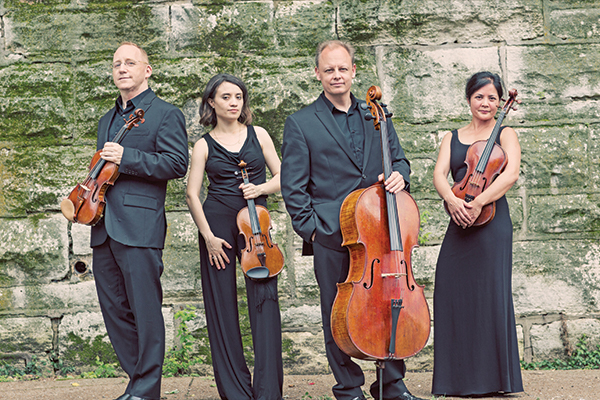
Arianna Quartet plays Mendelssohn and Tchaikovsky
Madeline Island Chamber Music is pleased to present Arianna String Quartet in concert on Madeline Island.
Arianna Quartet
John McGrosso, violin
Julia Sakharova, violin
Joanna Mendoza, viola
Kurt Baldwin, cello
Quartet in E-flat Major, Opus 44, No. 3
Felix Mendelssohn
Allegro vivace
Scherzo. Assai leggiero vivace
Adagio non troppo
Molto allegro con fuoco
Quartet No. 3, Opus 30
Peter Ilyich Tchaikovsky
Andante sostenuto – Allegro moderato
Allegretto vivo e scherzando
Andante funebre e doloroso, ma con moto
Finale. Allegro non troppo e risoluto
Felix Mendelssohn (1809-1847): Quartet in E-flat Major, Op.44, No.3
Felix Mendelssohn’s life story reads in a way that makes it difficult to believe one man could achieve so much in such a short life. Coming from a distinguished and wealthy family in Berlin, Mendelssohn was given the very best opportunities in education. His early music teachers immediately recognized his abilities, and he was systematically introduced to the preeminent teachers and performers in Europe. His early reputation was as a virtuoso pianist, but performing never dominated his career. Although we know Mendelssohn today principally as a composer of chamber music, symphonies, overtures, and concerti, he was best known during his life as a conductor. He first gained critical acclaim for an 1829 performance of Bach’s St. Matthew Passion in Berlin, which not only cemented him as a force from the podium, but helped to cultivate a modern appreciation of the music of Bach. From 1835-47, Mendelssohn held the post of Music Director of the Gewandhaus Orchestra in Leipzig, where he championed the works of Bach, Beethoven, Berlioz, Weber, and Schumann; he also founded and directed the Leipzig Conservatory in 1843.
As a composer, Mendelssohn’s roots spring from the masters of the 18th century. Although he cultivated a sense of orchestration and style distinctly his own, we hear his connections to Bach’s counterpoint and fugal writing, Haydn’s clarity of motive and form, Mozart’s expressive chromaticism, and to the power and drama of Beethoven’s voicing, harmony and orchestration. Although both of Mendelssohn’s first two string quartets, the Op.13 (written in 1827) and the Op.12 (written in 1829), pay homage to Beethoven, they clearly establish Mendelssohn’s own stunning style of writing for the genre. By 1838, when he completed his next three quartets, the Op.44 set, the irrepressible brilliance of Mendelssohn was unmistakable.
The Quartet in E-flat Major, Op.44 No.3, set in the same triumphant key as his ravishing Op.12 Quartet and Op.20 String Octet, shares a similar thread of heroic power juxtaposed against roiling pathos, and stunning tenderness and intimacy. Perhaps what makes the Op.44 No.3 quartet most remarkable is that within the expansive expression of the work, often sounding boundless and symphonic in scale, Mendelssohn manages to also cultivate a delicacy in the music that is poetic and vulnerable.
The broad sonata form first movement is propelled by an opening four-note motive heard at the outset in the first violin, a figure that when it’s not in the foreground as an ingredient in the first theme, infuses the music with a crackling energy and forward momentum throughout the four instruments. The more rhapsodic second theme helps to calm and soothe the texture, but the first theme material is always lurking near, ready to retake the spotlight.
The second movement scherzo, a style of movement that Mendelssohn became famous for because of the bright energy he created, is another example of what and can be done with an established form in the hands of genius. Shifting from E-flat Major to the relative key of C minor, Mendelssohn conjures a surprisingly dark landscape that, while fleet-footed, feels always poised to burst forth with an ominous power. Even in the more languid second theme, Mendelssohn keeps the movement percolating throughout, never letting it escape the brooding running lines in all four instruments. A sinister unison culminates the dramatic ride through the movement, as Mendelssohn brings the lines of the four instruments of the quartet together for a final wind-whipped statement of the first theme.
The slow third movement, set in the richness of A-flat Major, begins as a lyrical love song, with a hymn-like pace and texture, balanced and beautiful. As the movement progresses, Mendelssohn’s introduction of searching sixteenth note lines adds a sense of unresolved angst, and eventually, he brings these moving lines to the expressive forefront. Mendelssohn’s compositional virtuosity blurs the ABA form of the movement, instead painting a lamenting love poem that yearns for resolution, eventually coming to a peaceful close.
The finale returns to the spirit and key of the first movement, presenting a self-assured celebratory character that is both brilliant and fiery. Arpeggios and scales are passed between the four instruments, changing speed and direction unpredictably throughout, and moments of temporary calm are short-lived as the ebullience of the opening reclaims the lead, spinning the movement to its celebratory finish.
Peter Ilyich Tchaikovsky (1840-1893): String Quartet No. 3 in E-flat minor, Op. 30
When listening to the exquisite precision and beauty of Tchaikovsky’s works for string quartet, it is difficult to comprehend that this genre was not actually what he became best known for. Not only did he write only three string quartets (plus an earlier quartet, Op. posth.), but his complete output of chamber music is a mere six works. Nonetheless, each work is a masterpiece, and rivals most of the greatest works in the repertoire. Tchaikovsky wrote his final string quartet in one month during the spring of 1876, and dedicated it to the memory of his dear friend and colleague, Ferdinand Laub. Laub, who died the year before, was an acclaimed Czech violinist who had been the first violinist in the premieres of Tchaikovsky’s first two string quartets. The Quartet No. 3 received its first performance in the apartment of a friend, and then two weeks later, had audiences weeping at the formal public premiere.
The opening of the first movement is somber and plaintive, and the first violin leads an expressive hymn. Pizzicatti in the lower three instruments serve to usher in a funeral march that features a soaring theme in the first violin. Tragic yet hopeful, the music processes through a cello solo and back to the lamenting first violin. This introduction gives way to the body of the sonata form first movement. Although more effusive and energetic, the first theme is still ruminative in its expression, only occasionally giving way to robust outbursts. The arching second theme is more comforting in nature, and helps to set up a wonderful contrast of textures that Tchaikovsky exploits in the thorny development section. The lament of the first movement concludes with a revisit to the opening funeral march, now more poignant, with richer harmonies and a heightened expression.
The second movement is a bright scherzo in duple meter that sounds a bit more like Russian dance music than a traditional scherzo. The fun of the movement is Tchaikovsky’s unpredictable use of accents and his clever orchestration of the passing of lines between instruments. A lyrical center section serves as the trio of the movement, and is led by a beautiful viola solo, and then extended by the first violin. Tchaikovsky ingeniously weaves the return of the quick-footed scherzo back into the texture, and before we know it, we are again caught up in the dance of the opening.
The third movement Andante funebre is the emotional focal point of the quartet for Tchaikovsky, and leaves no doubt about the depth of his despair for the loss of his friend. The entire movement is played with mutes on the instruments, giving the sound of the quartet a veiled, distant, and eerie quality. Massive chords, tortured by unexpected internal dissonances, are punctuated by a heartbeat rhythm. Pizzicatti traveling through all four instruments in the quartet give a sense of ticking clock, before the music transitions back to the march of the opening. A beating heart in the second violin, nestled inside the texture of the quartet, helps to carry the music to the ethereal center section of the movement. The emergence of the ravishing center section makes the return to the opening funeral march that much more painful, as Tchaikovsky steers the music to its tragic, desolate end.
The finale is a spirited movement full of Russian flavored melodies, and punctuated by offbeat accents that give the music a youthful zeal. There is quite a bit of repetition of thematic material, but Tchaikovsky manages to create variety through an ever-changing orchestration of the instruments and stretti (imitation of motives in close succession). At the end of the movement, Tchaikovsky revisits the Andante march from the opening of the first movement, reminding us of the tortured, weighty music that has come before. Then, without warning, a Vivace coda bursts forth, providing the movement and quartet with a dazzling and hopeful ending.
Notes by Kurt Baldwin
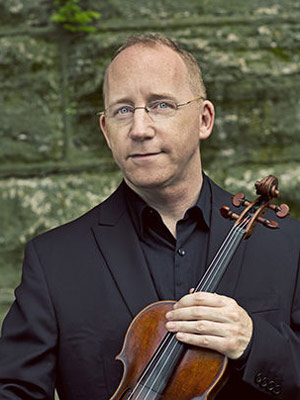
Hailed by the Boston Globe as “first class, with a robust sound and technique that seems to come from the center of the person” John McGrosso has been the first violinist of the Arianna String Quartet since 1998. He has been featured as a soloist with the Chicago Symphony and the St. Louis Symphony Orchestra, and has performed in recital to critical acclaim throughout the United States. During seven years as a member of the St. Louis Symphony Orchestra’s first violin section, Mr. McGrosso performed frequently in the orchestra’s “Chamber Music St. Louis” and “Discovery” series, and originated the popular “On the Stage” series of unique audience engagement evenings. He has taught on the faculties of Illinois Wesleyan University, the University of Missouri-Columbia, and Eastern Michigan University, and is currently an Associate Professor of Violin at the University of Missouri-St. Louis, where the Arianna Quartet is tenured and has been in residence since 2000.
As a member of the Arianna Quartet, he has collaborated with artists such as James Campbell, Gilbert Kalish, Bernard Greenhouse, Richard Stoltzman, and members of the Tokyo, Vermeer, and Juilliard Quartets, and been on the summer faculties of the Britt Institute, Madeline Island, and Music at Port Milford. Mr. McGrosso received his bachelors and masters degrees from Juilliard, and holds a Performer’s Certificate from Northern Illinois University. He also attended the Aspen Music Festival, the Steans Young Artist Program at Ravinia, and the Quartet Programme in Aldeburgh, England. His violin teachers have included Dorothy Delay, Shmuel Ashkenasi, Joyce Robbins, Joel Smirnoff, and Gerald Beal, and he has studied chamber music with members of the Juilliard, Tokyo, LaSalle, and Vermeer Quartets.
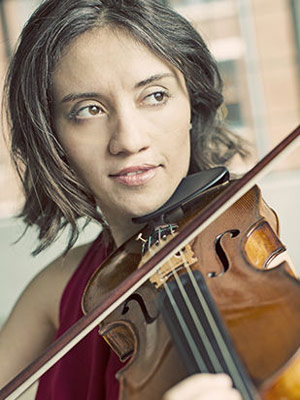
Julia Sakharova, violinist of the Arianna String Quartet, is an internationally established concert artist, known for her performances as soloist, orchestra performer, and chamber musician. She has been described by critics as projecting “incredible temperament, very fine sensitivity, and remarkable colors” and hailed for her “technically thrilling” and “powerful musical personality.” Before joining the Arianna String Quartet she served as Assistant Concertmaster with the Alabama Symphony Orchestra, was a member of the Albany Symphony in New York, and was a founding member of the acclaimed Erato String Quartet.
At the age of eight, Ms. Sakharova made her solo orchestral debut with the Moldova Philharmonic Orchestra. She has since appeared on numerous stages including Alice Tully Hall, Steinway Hall, Carnegie Hall, and the Library of Congress. She has performed in numerous festivals, recitals, tours, and competitions across her native Russia, Western and Southern Europe, Japan, South America, and the United States.
In 1999, after graduating from Moscow’s prestigious Central Special Music School under the renowned Tchaikovsky Conservatory, Ms. Sakharova moved to the U.S. to continue her education at Oberlin College, studying with Taras Gabora, Almita Vamos and Milan Vitek. A year later she made her West Coast solo debut at the Getty Center with composer and conductor John Williams and the Oberlin Orchestra. In 2006 she earned a master’s degree from the Juilliard School studying with Donald Weilerstein. While at Juilliard, she made her New York City orchestral debut under the baton of Maestro Mark Stringer and the Juilliard Orchestra, as well as her chamber music debut at New York’s Alice Tully Hall. Subsequently, she received a certificate for orchestral performance from the Manhattan School of Music studying with Glenn Dicterow and Lisa Kim of the New York Philharmonic.
In addition to the Arianna String Quartet’s ongoing recording project with Centaur of the entire Beethoven Cycle, Ms. Sakharova was featured on Rachmaninoff’s “Elegiaque Piano Trios” (Tavros Records) and on the recent 2014 release of Sean Hickey’s Cursive – Piano and Chamber Works (Delos). Mr. Hickey dedicated “Ampersand”, a work for violin and piano, to Ms. Sakharova, which she debuted at a 2006 Steinway Hall recital. A variety of other performances have also been featured in radio broadcasts on WQXR’s “Young Artists Showcase,” KMZT’s “Sundays Live”, Cleveland’s WCLV, and on St. Louis’ KWMU. Ms. Sakharova’s film score credits include Mimzy, The Perfect Stranger, and The Brave One.
Her competition credits include first prize at the International Competition for the Music of Eastern & Central Europe, Top Prize at the Olga Koussevitzky Competition for Strings, a top prize at the Jeunesses Musicales Montreal International Competition, and the first prize of the 2001 Coleman Chamber Ensemble Competition.
Ms. Sakharova has performed at festivals including the Music Academy of the West, Festival International de Colmar, the Verbier Festival & Academy, Keshet Eilon Violin Mastercourse, Kneisel Hall Chamber Music Festival, and the Bowdoin International Music Festival.
Currently, Ms. Sakharova serves on the violin faculty at the University of Missouri-St. Louis. As a dedicated educator, she has conducted master classes at the University of Iowa School of Music, Alabama School of Fine Arts, and Birmingham Southwestern College. She has also taught and appeared on stage at the Green Mountain Chamber Music Festival, Music Mountain Chamber Series, Madeline Island Chamber Music and the Femusc Festival in Brazil. Her residencies include the Peabody Conservatory, Oberlin College, Northern Illinois University, and Northwestern University. At the 2014 American String Teacher Association National Conference in Louisville, Kentucky, Ms. Sakharova, along with the Arianna String Quartet and her husband Clay McKinney, presented on the topic “Build a better phrase, build a better ensemble. Mapping the bow to achieve destination.” She is the recipient of the 2017 Artist Teacher Award from the American String Teachers Association.
Ms. Sakharova plays an 1819 Rafaelle and Antonio Gagliano.
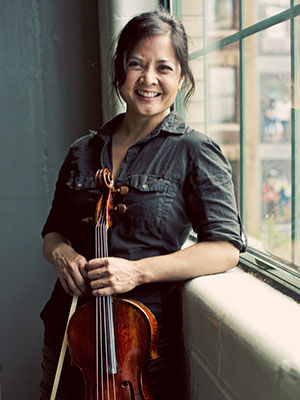
Lauded for her “eloquent phrasing” and “lush, sonorous and assertive tone,” Joanna Mendoza has been one of America’s most sought-after chamber music violists and teachers for the past twenty years. Performing throughout North America, South America, Europe, and South Africa, she has collaborated with artists such as Tsuyoshi Tsutsumi, Robert Levin, David Shifrin, Alex Klein, Anton Nel, along with members of the Cleveland, Vermeer, Miami, Cavani, and Pro Arte Quartets.
In 2008, Ms. Mendoza joined the Arianna String Quartet and the music faculty of the University of Missouri-St. Louis. Their work as performers, recording artists, and teachers takes them across the U.S. and abroad, from the Fort Worth Chamber Music Society in Texas to Cape Town Concert Series in South Africa and Sala Cecilia Meireles in Rio de Janeiro, Brazil. The ASQ can be heard on National Public Radio’s Performance Today, and on Live from Music Mountain, broadcast to 125 stations in the U.S. and to 35 countries. The Arianna Quartet’s recent recordings of the two Janacek Quartets, and the Early and Middle Beethoven Quartets, all released on Centaur Records, received critical acclaim. Highly sought-after teachers, the ASQ is regularly invited to colleges and conservatories worldwide including Peabody, Oberlin, University of Houston, and Northwestern, and in South Africa at Stellenbosch and University of Pretoria.
Prior to joining the Arianna Quartet, Ms. Mendoza was a ten-year member of the Harrington String Quartet who was featured in a PBS documentary, A Sound Collaboration: The Harrington String Quartet, and recorded a Grammy-nominated album of the works of Daniel McCarthy. She has also premiered works of Suzanne Farrin, John Novacek, and Kenji Bunch; Mr. Bunch’s “String Circle” was commissioned for her in 2004.
Individually and as a quartet member, Ms. Mendoza has performed and taught at festivals in and outside the U.S. including Interlochen Arts Camp, Killington, Mammoth Lakes, Midwest Young Artists, and Bellingham Music Festivals, Madeline Island Chamber Music, at RenMin University in Beijing, China, and Jaragua do Sul, Barra Mansa, and Rio de Janeiro in Brazil.
Ms. Mendoza received her training at the University of Wisconsin-Madison, and the Juilliard School.
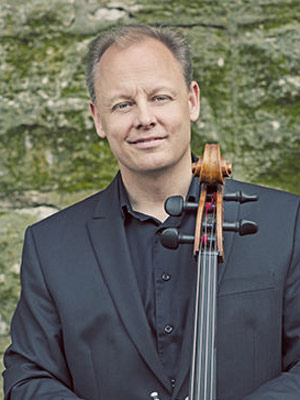
Kurt Baldwin is Associate Professor of Music at the University of Missouri, St. Louis, where the Arianna String Quartet has been in residence since 2000. As a founding member of the Arianna String Quartet in 1992, Mr. Baldwin has been awarded the Grand Prizes at the Fischoff Competition, Coleman Competition, and Carmel Competition, and was a Laureate at the 1999 Bordeaux International String Quartet Competition. Mr. Baldwin has concertized throughout the United States, Canada, Mexico, Italy, France and Japan, has been heard in live radio broadcasts in over 30 states and on NPR’s Performance Today, and has recorded for the Albany, Centaur and Urtext classical labels. He has collaborated with members of the Tokyo, Cleveland, Juilliard, and Vermeer quartets, as well as Richard Stoltzman, Bernard Greenhouse, Gilbert Kalish and James Campbell. He studied with Janina Ehrlich at Augustana College, received his bachelor of music degree from the San Francisco Conservatory with Irene Sharp, and earned a master of music degree from the New England Conservatory, where he was a student of Bernard Greenhouse. Mr. Baldwin also holds a Performer’s Certificate from Northern Illinois University, where he studied with Marc Johnson and the Vermeer Quartet.
2021 Quartet Sponsorship
The Julius Quartet’s Emerging Artists Quartet-in-Residence experience is supported by Robert and Carolyn Nelson.
The Emerging Artists Quartet-in-Residence is a new program of Madeline Island Chamber Music and provides a comprehensive package of performances, teaching opportunities, and mentorship during five weeks on-site at Madeline Island Chamber Music, and one week in Minneapolis-St. Paul.
Madeline Island Chamber Music is very grateful to Bob and Carolyn for supporting the inaugural year of this program and this opportunity for the Julius Quartet.
Designated Multi-Year Scholarships and Fellowships
Art and Gail Edwards Fellowship
Established in 2015 by former Madeline Island Chamber Music Board member Jan Edwards and her sister Gail Danae Kasbi, the Art and Gail Edwards Fellowship provides Fellowship funding in memory of their parents who were longtime supporters of Madeline Island Chamber Music.
Edith Wells Bristol Scholarship Fund
The Edith Wells Bristol Scholarship was established to honor Edie Bristol, a longtime Board member and supporter of Madeline Island Chamber Music. Income from this restricted fund is used to provide scholarship aid to one or more deserving students.
Pace Woods Fellowship
Established in 2013 by the Pace Woods Foundation, whose mission is “to improve the lives and futures of individuals.” It was given in memory of Pace Woods and provides Fellowship funding for 2020-2022.
Pries/Hutchinson Scholarship Fund
Created by Constance Pries and her late husband James in memory of Frederick O. Hutchinson, their good friend and Madeline Island Chamber Music’s Board Chair in 1989, this fully-endowed scholarship fund provides full tuition, room, and board annually.
Private Foundation Fellowship
This anonymous foundation began funding an annual fellowship in 2014 while simultaneously contributing additional funds to fully endow it by 2024.
2021 Fellowships
Biebl Family Fellowship
Funded by Madeline Island Chamber Music Advisory Committee member Kathleen Biebl and her husband Anthony.
Jonathan Swartz Fellowship
Funded by MacPhail Center for Music Board member Linda Mack and her husband Warren in honor of Madeline Island Chamber Music’s artistic director Jonathan Swartz.
Vicki and Chip Emery Fellowship
Funded by MacPhail Center for Music Board member Chip Emery and his wife Vicki.
Thomas George Fellowship
Funded by the donors and supporters of MacPhail in honor of Madeline Island Chamber Music’s first executive director who established the program in 1985.
Bob and Carolyn Nelson Fellowship
Funded by former Madeline Island Chamber Music Board member Bob Nelson and his wife Carolyn.
Virginia K. Townley Fellowship
Funded by former Madeline Island Chamber Music Board member Thomas T. Rogers in memory of his mother, Virginia K. Townley.
Madeline Island Chamber Music provides more than half of our students with financial aid ranging from modest scholarship assistance to full Fellowships covering their entire program experience. We are grateful to our donors for their commitment to these Fellowships and scholarships.
Individual and Institutional Contributors
Madeline Island Chamber Music gratefully acknowledges the following individuals and institutions that made gifts to us, dating from prior to the cancelled 2020 season through June 1, 2021.
$20,000 and Above
Art and Gail Edwards Donor Advised Fund of The Minneapolis Foundation
Anthony W. and Kathleen M. Biebl
Dorothy Richard Starling Foundation
Chip and Vicki Emery
Warren and Linda Mack
Bob and Carolyn Nelson
Sonja and Lowell Noteboom
Pace Woods Foundation
Private Foundation
Constance Pries
Thomas T. Rogers
Katherine and Douglas Skor
$10,000 to $19,999
Mark William Banks Trust
Estate of Edith W. Bristol
The Clinton Family Fund
Bob Davidson
Peter Havens
Ann and Terry Huntrods
Nancy Platt Jones and William Jones
MAHADH Fund of HRK Foundation
Caroline P. Marshall
CPM Legacy Fund of St. Paul Foundation
Tom Murtha and Stefanie Lenway
Mary J. Streitz
Virginia and Ed Stringer
$5,000-$9,999
The Dorsey & Whitney Foundation
Edward and Dawn Michael
Bethany and Christopher Owen
Robin Petty
Taft Stettinius & Hollister LLP
$2,000-$4,999
Susan and Paul Arneson
Gretchen and Mark W.* Banks
Fran Bly and Charles Hample
Ann and Bruce Christensen
Betty Jayne Dahlberg
Duluth-Superior Area Community Foundation
The Fredrikson & Byron Foundation
Leland and Bev Gehrke
Philip and Amy Goldman
Alex Haecker
Mary Louise and Patrick Irvine
John S. Winston Family Fund of the Minneapolis Foundation
Douglas R. Johnson
John Kaul and Gloria Gunville
Drs. Sidney and Lynne Levitsky
RBC Wealth Management
Elizabeth and James Ramsland
Mary Hulings Rice*
Peter and Sara Richter
Emily Skor and Sean Cairncross
Janet and Harvey Sternat
Marilyn and William Van Sant
Frederick and Eleanor Winston
$1,000-$1,999
Arts Midwest
Judith and Merrill Blau
Demaris Brinton and Theron O’Connor
Richard Chandler and Heidi Pankoke
Susan T. Chandler and Bruce McLellan
Maureen T. Curran
Dellwood Foundation Inc.
Jay Erstling and Pixie Martin
George and Judith Haecker
Marcia and Burke Henry
George and Pinny Kuckel
Leslie Livingston and David Miller
Kathleen McCartin and Andre Lewis
Polly G. O’Brien
Fred and Gloria Sewell
Gary Sherman
Brian and Nancy Siska
$500-$999
Anonymous
Tracy Bennett and Robert Bristol
Greg Bernstein
Keith and Barbara Clayton
Dorothy M. Dalquist
Missy and Dave Donkers
Energizer Holdings, Inc.
Kenneth Goldsmith
Carol and Edward Hancock
Dorothy Horns and James Richardson
Betsy Knode and James E. Newton
Magellan Cares Foundation
Lauren P. March
Paul Markwardt and Richard Allendorf
Sheila Merzer
Gregory J. O’Leary
Tracy Peterson
Barbara Pittman
Theresa and Theodore Priem
Connie and Lew Remele
Susan Saxl and Robert Kramer
Richard and Judith Schmidt
Charlie Stringer and Kristin Hahn Stringer
Paul A. Sturgul
Jonathan Swartz
Mark and Deb Swedberg
Annelise Swigert
Mr. and Mrs. James Wiltz
$250-$499
Lois Albrecht
Robert Alexander and Becky Stemper
Don Baur and Phebe Jensch
Ann P. Buran
James Burmeister
Kyle and Shelley Carpenter
Cindy and Michael Dalzell
Kari and Peter Davidson
Jane Emison
Rose Fahien
Donald H. Gray, Jr.
Ellen Jones and Bob McKlveen
Min-Jeong Koh
Joann and Don Leavenworth
Lucas Capital Management
Steven and Cynthia Mueller
Audrey and Rusty Nelson
Barbara and James Nendze
Dana and Kathy Noteboom
Robert and Jane Post
Katherine and Richard Rosenthal
Kathleen Russell
Pat and Judy Sebranek
Harvey and Nancy Smith
Marjorie J. Smith
1. Michael Streitz
Jean Thomson
Robin Trinko-Russell and Gary Russell
Peter Tropman and Virginia Graves
Tyson Family Charitable Fund of the American Endowment Foundation
Donna Woods and Dr. Jon Hinrichs
$100-$249
Paul Babcock
Judith and Terence Ball
Lucy Banta
David Bjork and Jeff Bengtson
Hans and Christina Bjornson
Susan and Sandy Boyd
Judith and Arnold Brier
Susan and Tom Brust
Laura Nash Campbell and Eric Johnson
Anne Carter
Cecil and Penny Chally
Sheila Coyle
Alice Dickinson
Mrs. Douglas Dillard
Michael and Marilyn Dunlap
Martha W. Edgar
Victoria Erhart
Susanne K. Gens
Debbie Giachini
Janice and Fritz Grutzner
Bob and Janet Hanafin
Susan Jane Hedman
Andra and Patricia Herriott
Nell Hillsley and Van Lawrence
Mary Abbe Hintz
Alan and Judith Hoffman
Drusilla Cagnoni and Alexander Jacobs
Larry Kaufmann
Catherine and Dennis Kilbane
Richard Killmer
Susan and Edward Korleski
Ms. Judy Lin
Margaret Longlet
Brook W. Martin
Richard and Mickey Martin
Meredith and Brian McCormick Jr.
Peter and Cheryl McMullen
Sheila Mitchell
Caroline and Greg Moore
David and Audrey Nelson
Ardelle Norgaard
Mary D. O’Brien
Gil Overson
Peter and Joni Petschauer
Kathleen and Gene Ramsay
Phyllis and Gary Reiman
Judeth Reinke
Sarah Renner
Russ and Karen Rubin
Barbara and Bob Scott
Pitnarry Shin and Kyu-Young Kim
Marc D. Smith
Carolyn P. Sneed
Cynthia Turecamo
Mary B. Virre
Maxine Wallin
Robert Webb
Zoe V. A. Wells
Philip H. Willkie
James Wittenberg and Pam Weiner
Evelyn S. Wright
Wilson Yates
$1-$99
Carole J. Anderson
Linda Schaars Barnes
Angela and Ralph Breeden
Peggy and Joseph Carver
Karen Ruedi Crowell and Mike Crowell
Yvonne Foster
Jeff Goldenberg
Katie Heilman
Miriam Hof
Joel and Linda Jackson
Dr. and Mrs. Kenneth N. Krutsch
Josh LaGrave
Josh Lavik
Howard Ledin
Gay J. Lindquist
Kathleen Lytle and Allen Hoglund
Dennis and Barbara McCann
Rebecca E. McDowell
Mr. and Mrs. Greg Miller
Sarah and Nile Norton
Allen and Gail Ofstehage
Dawn Olver
Peter M. Rogers
Abigail and Charlie Singleton
Ann and Willy Stern
Stanley Wai and Gayle Jorgens
Jessica S. Walker
Marty Vadis
Gingie Ward
Kelly Webb
Peggy and Richard Williams
Gifts in Honor Of
Edie Bristol
Leslie Livingston and David Miller
David J. Buran
Ann P. Buran
Thomas M. George
Mary Streitz
Marcia & Burke Henry
Phyllis and Gary Reiman
Ann Huntrods
Kathleen and Gene Ramsay
Linda Mack
Jay Erstling and Pixie Martin
Wilson Yates
Warren Mack
Wilson Yates
Thomas Murtha
Gregory J. O’Leary
Sonja and Lowell Noteboom
The Clinton Family Fund
Dr. and Mrs. Joseph Pittman
Barbara Pittman
Mary Hamel Scallen
Mary D. O’Brien
Dr. Irving Shapiro
Mary J. Streitz
Abbott Sherwin
Kathleen and Gene Ramsay
Isaac Sherwin
Kathleen and Gene Ramsay
Gifts in Memory Of
Mark W. Banks
Gay J. Lindquist
Katherine and Douglas Skor
Edie Bristol
Lucy Banta
Tracy Bennett and Robert Bristol
Angela and Ralph Breeden
Laura Nash Campbell and Eric Johnson
Anne Carter
Peggy and Joseph Carver
Mrs. Douglas Dillard
Yvonne Foster
Debbie Giachini
Larry Kaufmann
George and Pinny Kuckel
Leslie Livingston and David Miller
Lucas Capital Management
Lauren P. March
Brook W. Martin
Meredith and Brian McCormick Jr.
Peter and Cheryl McMullen
Mr. and Mrs. Greg Miller
Caroline and Greg Moore
Dawn Olver
Peter and Joni Petschauer
Robert and Jane Post
Judeth Reinke
Katherine and Douglas Skor
Cynthia Turecamo
Tyson Family Charitable Fund of the American Endowment Foundation
Mary B. Virre
Kelly Webb
Robert Webb
Peggy and Richard Williams
Michal Bristol
Leslie Livingston and David Miller
Marilyn Davidson
Kari and Peter Davidson
Howard Ledin
Marion C. Gray
Donald H. Gray, Jr.
William Griffith Harbison
Carol and Edward Hancock
Barbara Peet
Sarah Renner
James Pries
Dr. and Mrs. Arnold Brier
Barbara and James Nendze
Dr. Irving Shapiro
Jeff Goldenberg
Warren and Linda Mack
Janet Shapiro
Mary J. Streitz
*Deceased
Please excuse any errors or omissions that may have occurred during Madeline Island Chamber Music’s transition to MacPhail. If we have inadvertently omitted your name or listed it incorrectly, please accept our apology and contact Erika Malpass at [email protected].
In-Kind Contributions
Dorsey & Whitney LLP / Mary Streitz, Esq. – Professional fees and meeting facilities
Family of Alice Cadotte – Lodging
Claire Givens Violins – Instrument loans
Lathrop GPM / Greg A. Larson, Esq. – Professional fees
Madeline Island Ferry Line – Transportation
Sylvan Design – Fountain maintenance
Taft Stettinius & Hollister LLP – Meeting facilities
Mark and Ewa Weir – Lodging
